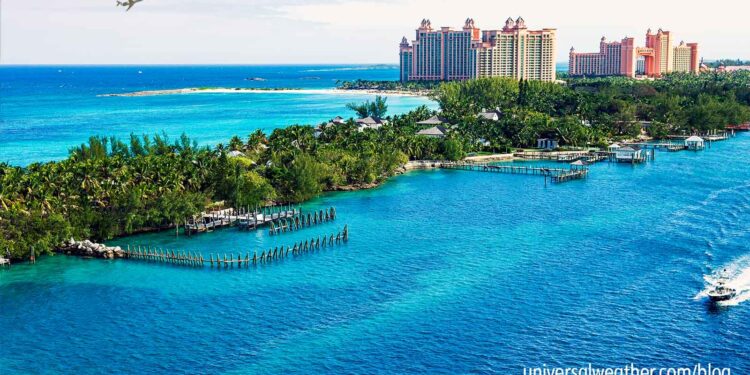Business Aircraft Operations to the Bahamas – Part 2: Handling, Fuel & Local Area

This business aviation blog post continues from our article last week, entitled, “Business Aircraft Operations to the Bahamas – Part 1: Airports, Permits & CIQ.”
For business aircraft operators, the quality of support services and infrastructure at outlying airports in the Bahamas is not the same as what you’ll experience at major airports there. Advance confirmation of required services is recommended – particularly in terms of aviation fuel, credit and in-flight catering availability – when operating to smaller locations in the island group.
The following is an overview of what you need to know:
1. Ground handling considerations
Larger airports in the Bahamas typically offer full GA support services, including tow bars and ground support equipment (GSE), fuel, lav and water services, VIP lounges or fixed-base operators (FBOs), in-flight catering, and hangar availability. Credit, with advance arrangement, is available for handling, aviation fuel, and airport charges at larger locations.
2. Handling at smaller destinations
At smaller airport locations in the islands GSE, lav/water services, in-flight catering and passenger lounge facilities may be limited or unavailable. Crew accommodation options at outlying destinations are often very limited, and there are often limitations in terms of local transport options. During high season (November-March) hotels are in high demand, and accommodations may be non-refundable/non-changeable and/or require prepayment.
3. In-flight catering
While in-flight caterers are available at larger locations you’ll likely need to self-cater, from hotels or local restaurants, when operating to more out-of-the-way locations. Note that in-flight catering options are restricted at smaller locations and additional lead time is needed for catering requests. At smaller locations it may be best to bring catering in with you for the return trip or to reposition the aircraft to pick up catering after departure.
4. Aviation fuel and credit
Be aware that aviation fuel may be limited or unavailable at smaller locations. It’s always recommended to confirm fuel availability in advance, particularly for operations during high season. Credit for fuel and services will depend upon the location you’re operating to. At some outlying airports local agents may require pre-payment or payment on arrival. Some aviation fuel cards/ carnets are not accepted at certain locations, so it’s suggested that all credit arrangements be confirmed in advance.
5. Ramp access and airport security
Airport security is generally very good in the Bahamas. Ramp access by private and/or vendor vehicles may be approved, on a case-by-case basis, depending upon the airport. At Nassau (MYNN) you’ll typically go through the FBO and out to your aircraft. At other locations, it may be possible to arrange vehicle access, directly to your aircraft, although this is at airport authority discretion.
6. Agricultural restrictions
Upon landing in the Bahamas local agriculture authorities may require you to dispose of certain open or perishable foods on landing. It may be possible, however, to keep certain perishable foods onboard, or stored at the airport with your ground handler, for a return or onward flight leg. Agriculture restrictions should always be researched in advance of arrival.
7. Pet and weapon restrictions
Bahamas has restrictions on temporary importation of pets. To bring a domestic pet into the islands requires a vaccination certificate and pet health documentation. It’s recommended that pet restrictions/requirements be confirmed well in advance of day of operation, to ensure you will not have issues on arrival. Likewise, onboard weapons are not permitted into the Bahamas without prior approval.
8. Uncontrolled airfields
It’s important to review Article 56 of Air Navigation Order when planning operations to uncontrolled airports in the Bahamas. Bahamian authorities limit the number of after-hours movements into/out of uncontrolled airports. So, it’s best to plan arrivals/departure from uncontrolled airports prior to sunset.
9. Tech stop considerations and cabotage
Be aware that if you’re operating a charter flight you’ll require a landing permit even for tech stops. Customs, immigration, and quarantine (CIQ) clearance is typically not needed for international tech stops, so long as no crew/passengers embark/disembark. There are cases, however, where customs may do a sort of express CIQ clearance – at their discretion – during tech stops. Cabotage restrictions are not an issue for domestic operations of foreign-registered private or charter aircraft in the Bahamas.
Conclusion
The risks you may encounter in the Bahamas have more to do with restricted availability of services, accommodations, and local transport. During high season hotel prices are higher and preferred accommodations may not be available. Be aware of agricultural, pet, and weapon restrictions for the country. It’s always recommended to check this information in advance to avoid issues upon arrival.
Questions?
If you have any questions about this article or would like assistance planning your next trip to the Bahamas, contact me at jacobreader@univ-wea.com.




